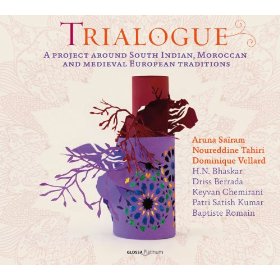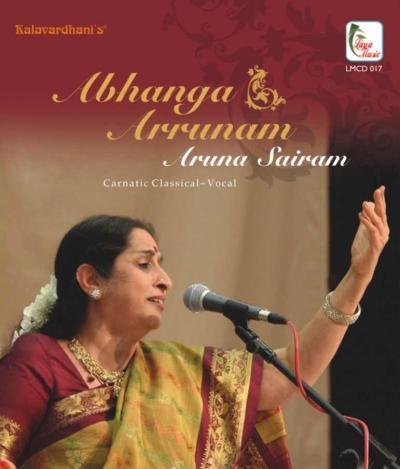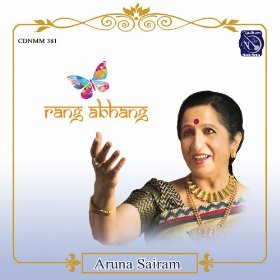MAYAKKUM Margazhi WE USED TO OPEN OUR EARS AND WRITE THE NOTES IN OUR HEARTS
-
By Sharanya
This was one semma conversation — a chat between the seasoned musician like Aruna Sairam and the young Nisha Rajagopalan. They might be generations apart, but both shared a surprising camaraderie, what with Nisha using this opportunity to clear all her doubts and Aruna offering her advice. Both Aruna and Nisha are happy that the Margazhi season is going strong without any interruptions from Mother Nature as it had been happening in the past couple of years. So, here they are, the duo discussing all things music over an hour-long chat. Excerpts:
Carnatic music over the years…
Aruna: I went for a sound check for one of my performances and it seemed like I had gone down the memory lane. There were young musicians running around and chatting with their seniors and opinion makers in the sabha. Things were exactly the same 30 years ago, too. I remember running around the same places, trying to catch a glimpse of some senior musician. In that sense, I am so happy there is still that excitement for Carnatic music among the youngsters.
Nisha: Yes, the enthusiasm hasn’t waned. Also, technology has helped us reach out to many more people. Recently, a portion of my concert went live on Facebook and several people pinged me. Though a large number of people enjoy live concerts, technological advancements like this have only helped us reach out to those who don’t come to listen to concerts. So, things are evolving in the Carnatic music scene. And gladly, all of them are only helping it grow.
MARGAZHI MUSINGS WITH ARUNA AND NISHA
Collaborations, the way forward…
Aruna: In the early 1990s, when I first had the chance to go to Germany and teach Carnatic music, I was dismayed with the response. There was no excitement in the conservatory; no one paid attention to me or my music. Had something similar happened in India, people would have rushed to learn. This incident made me think that we are too much into ourselves. In the sense, we take pride in our music, but when it is performed elsewhere without a context does it reach out? That was why, 30 years ago, I decided to do collaborate with German and French artistes, jazz pianists, musicians from the USA, and more. And for that, the first thing I had to do was forget the fact that I am Carnatic musician. Once you get rid of such hang-ups, things will ease up. However, doing these collaborations during the season is a personal call. I schedule my collaborations through the rest of the year, but not in December.
Nisha: I too find collaborations interesting. I have done jugalbandis before and I thoroughly enjoyed being a part of the same, but at this point, I am leaning more towards doing typical concerts in December.
Competition among Carnatic musicians…
Nisha: Ever since the advent of Youth Association for Classical Music (YACM), opportunities abound for youngsters. It is not like you have to sing only in a certain sabha. And though not all of us are close friends, we are helpful and supportive of each other. Today, I can ask a fellow musician to record and send a song that I am not fluent in. It is more of a friendship, with a little competition, but in a positive way. There is no jealousy among our peer group. Also, we should be our biggest competitor. Just because I performed well last year, I shouldn’t take it easy this time. It is a constant journey to prove ourselves.
Aruna: Competition is healthy; it makes you attentive. I feel it is necessary. I firmly believe that there is space for everyone, but the ultimate test is the audience. If they come in droves, then everything falls in place.
The advantages of being a musician
today…
Aruna: There are so many. For example, the ability to tape something and play it back is a huge thing. When I was a student of Brinda ma, I was all of 10. I was an onlooker first and then became her student. I still remember her teaching some of my seniors. One of the senior artistes came to her class with a book and pen. That day, Brinda ma didn’t start the class. She asked the artiste why she had brought them. When the musician said she wanted to take notes, my guru asked her to open her ears and write the notes in her heart. That is how we learnt in those days. It made us more attentive. Having said that, it is easier for all of us today to just make it into a sound file and store it. Also, music is being preserved, this way.
Nisha: Technology is used to the maximum, I agree. From sharing recording on WhatsApp, seeing video recordings of legends singing to taking a picture of the notes – it has only become easy. But sometimes, it costs us that personal interaction with seniors. People are learning on Skype today; I don’t know how much you can take in unless you have a certain musical maturity. You need to build a rapport with your guru, too.
Aruna: Oh yes, the guru doesn’t just teach music, but mould your personality, too. Unless you go through the process your art won’t make an impact. Just being with the guru, talking to them and seeing how they approach a raga makes a lot of difference.
Nisha: True. But the good thing is that over time, senior musicians have become more approachable.
Aruna: (laughs) I can’t imagine talking to Brinda ma like this. There was a certain distance…
Classical musicians and pay structure…
Nisha: As freelance artistes your pay isn’t fixed, right? But I don’t have this issue.
Aruna: I can only speak for myself. For the music season, I see it as a social responsibility to give them back as they were the ones who supported me when I started off. I don't charge them my entire fee because it is my contribution to the sabha system. It is payback time… I never keep finance as priority. This is tapasya time, for me to rejuvenate my system.
The UNESCO recognition …
Aruna: Generally, the awareness for Carnatic music is less up north. But as a musician who was raised in Mumbai, I can say that Mumbai has a rich Carnatic music culture. And that is why so many of us could come out of Mumbai and become top-class musicians here. Being the vice chairman of the Sangeet Natak Akademi, I can now say that Shekher Sen, the chairman of the board and other executives, have a good understanding of Carnatic music, and musicians, and do help in getting it recognition at a global level, by giving them fellowships. And yes, we need to make Margazhi a A National Festival. And for this, we need a common platform, where all the sabhas can be represented, in the form of an App. From doing bookings to knowing what’s happening where – everything should be available for people who are coming from outside. For example, the Edinburgh festival, despite being smaller in magnitude, is very user-friendly and has everything available on a single platform. For starters, our airport should breathe music, during the season and display schedules of the concerts.
Nisha: Yeah, and they can even make the season a tourist attraction, and give visitors options for accommodation, food, shopping and more.
NISHA ASKS, ARUNA ANSWERS
As a young musician, it is difficult to maintain work-life balance. How do you do it?
It is difficult to switch off. If you have little ones at home, the only way is to request the elders of the house to take care of them. I also do pranayama and meditation. This is a process that helps in centering yourself. You never know what can happen on the day of your concert to throw off your balance. Though it sounds like a cliché, I resort to bhakthi. I also tell myself that everything can wait till the concert is over.
But what if you can’t concentrate during the concert?
Usually, I plan my concerts. But after three songs if it’s not going well with the audience, I immediately change track. There are some songs and ragas that are mine and in my gut. If anything goes wrong, I switch on the safety mode and sing those ragas. Ninety per cent of the time, that works and I get back to my routine once I satisfy my audience.
How do you maintain rapport
with the rasikas?
I am not one of those artistes who have always performed to packed houses. There have been times when I have prayed to see some audience in the venue. It was so difficult during that period, which even made me think whether I should continue with this career. But something kept pushing me. You don’t have any control over what you get and what you don’t. Earlier, I used to consider it lucky that I was Brinda Ma’s disciple. But then, I realised such tags were meaningless — and that was when I started presenting my music to the rasikas as a humble musician, and not some greatest person in the world. I went to them full of mistakes, and spoke to them through music.
You sing Abhangs…
My life has had several parallel tracks. I have also learnt from my mother, who learnt it from Alathur Brothers. Both come different schools, but I learnt some 200 pieces from them, including several bhajans and Abhangs. So, I developed a love for this kind of music, too. It is an ‘aha’ moment for me whenever I hear someone sing Abhangs. It wasn’t like I decided to sing that genre, and do something different. It came naturally to me. Also, legends like MSS and MLV have also sung Abhangs before me.
SHARING RECORDINGS, TO TAKING PICTURES OF NOTES, IT’S EASY NOW WE NEED TO MAKE MARGAZHI NATIONAL FESTIVAL AND FOR THIS, WE NEED A COMMON PLATFORM
— ARUNA SAIRAM
Related Albums

Trialogue
Published : 2012
By : Glossa Music
Abhanga Arunam
Published : 1994
By : Kalavardhini's
Rang Abhang
Published : 2011
By : Nadham Music Media
Related Concerts
- Bolava Vitthal - Celebrating Ashadhi Ekadashi An Evening of Abhangs
On : Friday, July 27, 2018
